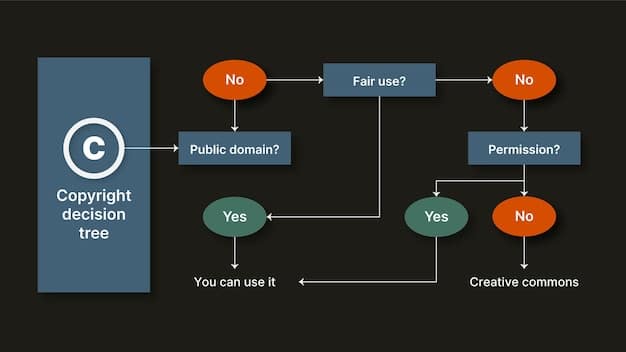Whistleblower Protection: 5 Key Changes for US Corporations

Whistleblower protection in the US requires corporations to implement key changes, including robust reporting systems, anti-retaliation policies, independent investigations, regular training, and confidentiality measures, to foster ethical conduct and avoid penalties.
Is your company truly prepared to handle whistleblowers fairly and effectively? Navigating the complexities of whistleblower protection: 5 key changes US corporations need to implement now to avoid penalties is essential for maintaining a compliant and ethical workplace.
Understanding the Imperative of Whistleblower Protection
The importance of whistleblower protection cannot be overstated in today’s corporate landscape. It’s not just about ticking boxes for compliance; it’s about fostering a culture of integrity and transparency.
Whistleblower protection encourages employees to report suspected wrongdoing without fear of retaliation, ultimately safeguarding the company from potential legal and reputational damage.
Why is Whistleblower Protection Crucial?
Effective whistleblower protection systems are more than just legal requirements; they are integral to maintaining ethical standards and promoting corporate responsibility.
- Early Detection of Misconduct: Whistleblowers often bring critical issues to light early, giving companies time to address problems before they escalate.
- Promoting a Culture of Integrity: Strong protection signals that the company values ethics and transparency, encouraging employees to act responsibly.
- Avoiding Costly Penalties: Compliance with whistleblower protection laws can help companies avoid significant legal and financial repercussions.
Ignoring whistleblower protection can lead to severe consequences, including legal penalties, damage to reputation, and erosion of employee trust. Proactive measures are essential to safeguard the company and its stakeholders.

Establishing Robust Reporting Systems
A robust reporting system is the cornerstone of any effective whistleblower protection program. It provides employees with a safe and confidential avenue to voice their concerns.
Without a clear and accessible reporting channel, potential whistleblowers may hesitate to come forward, leaving serious issues unaddressed. Reporting systems should be easy to use and widely publicized.
Key Components of an Effective Reporting System
A well-designed reporting system should include multiple channels (e.g., hotline, email, online portal), clear procedures for reporting, and stringent confidentiality measures.
- Multiple Reporting Channels: Offering various options ensures that employees can choose the method they are most comfortable with.
- Easy-to-Understand Procedures: Clear guidelines on how to report concerns and what information to include can streamline the process.
- Confidentiality and Anonymity: Ensuring that whistleblowers can report concerns without fear of exposure is critical to encouraging participation.
Investing in a robust reporting system is an investment in the ethical health of the company. It empowers employees to speak up and helps management identify and address issues quickly and effectively.
Implementing a Strict Anti-Retaliation Policy
One of the most critical aspects of whistleblower protection is a strict anti-retaliation policy. It assures employees that they will not face adverse consequences for reporting concerns in good faith.
Retaliation can take many forms, including demotion, harassment, or termination. A strong anti-retaliation policy clearly prohibits these actions and provides avenues for redress if they occur.
Essential Elements of an Anti-Retaliation Policy
An effective anti-retaliation policy should define what constitutes retaliation, outline disciplinary measures for those who retaliate, and offer support for whistleblowers who experience retaliation.
- Clear Definition of Retaliation: Providing explicit examples of retaliatory actions helps employees understand their rights and protections.
- Disciplinary Measures: Holding individuals accountable for retaliation sends a strong message that such behavior will not be tolerated.
- Support for Whistleblowers: Offering resources like counseling or legal assistance can help whistleblowers navigate the challenges they may face.
A credible anti-retaliation policy must be more than just words on paper. It requires consistent enforcement and a commitment from leadership to protect those who speak up.

Conducting Independent and Impartial Investigations
When a whistleblower report is received, it is crucial to conduct an independent and impartial investigation. This ensures that the concerns are thoroughly examined and that appropriate action is taken.
Investigations should be conducted by individuals or teams who are free from conflicts of interest and who have the expertise to evaluate the allegations effectively. Transparency and fairness are paramount.
Ensuring Investigative Integrity
To maintain the integrity of the investigation, it’s important to establish clear protocols, document all findings, and provide regular updates to the whistleblower.
- Clear Investigative Protocols: Standardized procedures ensure that all investigations are conducted consistently and fairly.
- Thorough Documentation: Comprehensive records of interviews, evidence, and findings are essential for maintaining transparency.
- Regular Updates: Keeping the whistleblower informed (within legal limits) shows that their concerns are being taken seriously.
Independent and impartial investigations not only help uncover wrongdoing but also demonstrate the company’s commitment to ethical conduct and accountability.
Providing Regular Training on Whistleblower Protection
Regular training on whistleblower protection is essential for ensuring that all employees understand their rights and responsibilities. Education can help foster a culture of compliance and ethical behavior.
Training programs should cover the company’s whistleblower policy, reporting procedures, and anti-retaliation measures. They should also emphasize the importance of speaking up when witnessing misconduct.
Key Elements of Effective Training
Effective training programs should be interactive, engaging, and tailored to different employee roles and responsibilities. They should also be updated regularly to reflect changes in laws and regulations.
- Interactive Sessions: Engaging employees through case studies, role-playing, and Q&A sessions can reinforce learning.
- Customized Content: Tailoring training to specific job functions ensures that the information is relevant and practical.
- Regular Updates: Keeping training programs current with the latest legal and regulatory changes is crucial for maintaining compliance.
Investing in regular training programs demonstrates a commitment to whistleblower protection and helps create a more ethical and transparent workplace.
Maintaining Confidentiality and Protecting Identities
Maintaining confidentiality and protecting the identities of whistleblowers is vital for encouraging employees to come forward. A perceived lack of confidentiality can deter potential reporters and undermine the entire system.
Companies should implement measures to safeguard whistleblower identities throughout the reporting and investigation process. This includes limiting access to reports and redacting identifying information where possible.
Strategies for Ensuring Confidentiality
To ensure confidentiality, companies can use secure reporting channels, implement strict access controls, and provide training to those involved in handling whistleblower reports.
- Secure Reporting Channels: Using encrypted communication platforms can protect the confidentiality of reports.
- Access Controls: Limiting access to whistleblower reports to only authorized personnel can prevent leaks.
- Training for Handlers: Educating those who handle reports on the importance of confidentiality can help minimize the risk of exposure.
Protecting whistleblower identities is not only ethically sound but also legally required in many jurisdictions. A strong confidentiality policy reinforces the company’s commitment to supporting those who speak up.
| Key Aspect | Brief Description |
|---|---|
| 🚨 Reporting Systems | Establish multiple, confidential channels for reporting misconduct. |
| 🛡️ Anti-Retaliation | Implement strict policies to protect whistleblowers from any adverse actions. |
| 🔍 Investigations | Ensure impartial and thorough investigations of all reported concerns. |
| 📚 Training | Provide regular training to employees on whistleblower policies and procedures. |
Frequently Asked Questions
▼
Retaliation can include demotion, termination, harassment, or any adverse action taken against an employee for reporting concerns in good faith. Protecting against such actions is crucial.
▼
Companies can use secure reporting channels, limit access to reports, and redact identifying information to protect whistleblower identities. Training for handlers is also vital.
▼
Offering various reporting options, such as hotlines, email, and online portals, ensures that employees can choose the method they are most comfortable with, encouraging more reports.
▼
Training programs should cover the company’s whistleblower policy, reporting procedures, anti-retaliation measures, and emphasize the importance of speaking up when witnessing misconduct.
▼
Investigations should be conducted by individuals or teams who are free from conflicts of interest and have the expertise to evaluate the allegations effectively, ensuring impartiality.
Conclusion
Implementing these five key changes – robust reporting systems, strict anti-retaliation policies, independent investigations, regular training, and confidentiality measures – is crucial for US corporations aiming to foster ethical conduct and avoid penalties related to whistleblower protection. By prioritizing these measures, companies can create a culture of transparency and accountability that benefits both employees and the organization as a whole.





